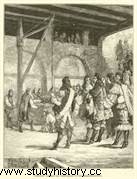 Jean-Baptiste Colbert (1619-1683) was one of Louis XIV's most important ministers. Recommended by Cardinal Mazarin, Colbert quickly became one of the young king's main advisers. In 1665, after participating in the fall of Nicolas Fouquet, he in turn became Superintendent of Finances. Promoter of royal factories and trading companies, he also exerted his influence on the internal and external policy of the Sun King. Most illustrious of the great clerks of the State, Colbert not only marked his time under Louis XIV, but also left a lasting mark on French politics, to the point of giving his name to a doctrine:Colbertism, a mixture of protectionism and state intervention in the economy.
Jean-Baptiste Colbert (1619-1683) was one of Louis XIV's most important ministers. Recommended by Cardinal Mazarin, Colbert quickly became one of the young king's main advisers. In 1665, after participating in the fall of Nicolas Fouquet, he in turn became Superintendent of Finances. Promoter of royal factories and trading companies, he also exerted his influence on the internal and external policy of the Sun King. Most illustrious of the great clerks of the State, Colbert not only marked his time under Louis XIV, but also left a lasting mark on French politics, to the point of giving his name to a doctrine:Colbertism, a mixture of protectionism and state intervention in the economy.
Colbert's dazzling career under Louis XIV
Son of a draper merchant who had not done very well, Fouquet began his career as a minor clerk in the War Offices, under Le Tellier. Councilor of State in 1649, he became a "domestic" of Mazarin, where he kept the accounts and managed the personal assets. Having become the confidant of the cardinal, he rendered him great services and was his agent in Paris when Mazarin had to go into exile during the troubles of the Fronde. While showing himself a zealous servant, Colbert did not forget his own interests; by doing the cardinal's business, he was doing his own and enriched himself, a little quickly, because he was unscrupulous about the means to be used to achieve it.
But he was a hard worker, fond of order and method, a man of the cabinet with well-kept records, a serious civil servant, unquestionably devoted to the State. As much as his ambition to restore healthy finances to France, it was the ferocious jealousy he felt towards Fouquet, a worldly and sumptuous great lord, which prompted him, as early as October 1659, to send Louis XIV a terrible indictment against the superintendent's management.
 From that moment Colbert applied for the succession of Fouquet. Mazarin, shortly before dying (1661), recommended him especially to the young king. Appointed Intendant of Finances (1661), Colbert continued to patiently and quietly build up a heavy file concerning Fouquet's embezzlement; he enlightened, harassed the king in secret and this long undermining work finally led to the downfall of the superintendent (September 1661). Superintendent of Buildings and Manufactures (1664), he received the following year the post of Comptroller General of Finances (1665), which did not give him all the powers of Fouquet because Louis XIV, decided to reign personally reserved the scheduling of expenses. Colbert knew how to stay in his rank of petty bourgeois ennobled, giving the monarch the illusion of being the only master.
From that moment Colbert applied for the succession of Fouquet. Mazarin, shortly before dying (1661), recommended him especially to the young king. Appointed Intendant of Finances (1661), Colbert continued to patiently and quietly build up a heavy file concerning Fouquet's embezzlement; he enlightened, harassed the king in secret and this long undermining work finally led to the downfall of the superintendent (September 1661). Superintendent of Buildings and Manufactures (1664), he received the following year the post of Comptroller General of Finances (1665), which did not give him all the powers of Fouquet because Louis XIV, decided to reign personally reserved the scheduling of expenses. Colbert knew how to stay in his rank of petty bourgeois ennobled, giving the monarch the illusion of being the only master.
He was a cold bureaucrat, "capable of black perfidy, violence, baseness (Lavisse). The court hated him, but he ignored the court. His unconditional fidelity earned him heaps of favors and titles; with his first functions, he still combined the posts of Secretary of State at the King's House (1668) and at the Navy (1669); he took advantage of Seguier's old age to encroach upon the legislature and the judiciary; he became lord and marquis of Seignelay and, with a funny fatuity, he tried to say "my subjects", "my vassals", "my river". He placed his brothers, his daughters (who became Duchesses of Chevreuse, Beauvilliers and Mortemart), his sons (one went to the Navy, the other to the Archdiocese of Rouen), his brother-in-law, his nephew , his cousins... Of the government, only Foreign Affairs (to Lionne) and War (to Le Tellier) escaped him. For a long time, moreover, a bitter struggle for places and honors opposed the Colbert clan and the Le Tellier clan.
Colbert's reforms
If the man hardly arouses sympathy - especially in contrast to his victim, the seductive Fouquet -, the greatness of the minister is undeniable. For nearly twenty-five years, Colbert was responsible for all of France's economic and financial life. He was one of the greatest ministers of the monarchy, the main architect of the power of Louis XIV. Its reforming action was exercised in the most diverse fields, financial, economic, commercial, maritime, intellectual, with the constant concern for the wealth and the glory of the king, that is to say of the State. “We are not in a reign of small things”, he said as early as 1664. In the policy of grandeur in which the ambition of Louis XIV committed France, to face wars and an equally costly diplomacy”, not to mention of the great train of the court of Versailles, was an overwhelming task for a Minister of Finance.
Disdainful of "stewardship", Louis XIV did not hesitate to anticipate large amounts of revenue, and Colbert did not succeed in eliminating the deficit which reappeared from the Dutch war (1672), never to disappear again. As soon as he came to business, Colbert had however taken draconian measures to make the money powers give up. The 1662 chamber of justice succeeded in obtaining some restitutions from the state farmers. But military needs soon forced Colbert to resort to expedients, as his predecessors had done; it was necessary to found a Loan Fund (1674), to create and sell offices, to increase indirect taxes.
 However, Colbert had tackled one of the essential aspects of the financial problem, the reform of the tax system. Due to the diversity of old France, still bristling with privileges and freedoms, taxation was extremely confusing and varied. To ensure a better output of the size, commoner tax, Colbert undertook the hunt for the false nobles and the false tax exemptions; in 1680, he created the General Farm, which was responsible for levying all other contributions; public accounting was ordered and simplified.
However, Colbert had tackled one of the essential aspects of the financial problem, the reform of the tax system. Due to the diversity of old France, still bristling with privileges and freedoms, taxation was extremely confusing and varied. To ensure a better output of the size, commoner tax, Colbert undertook the hunt for the false nobles and the false tax exemptions; in 1680, he created the General Farm, which was responsible for levying all other contributions; public accounting was ordered and simplified.
But these measures could only have produced their full effect if they had been part of a general rationalization of the administration. Colbert was irritated by the variety of administrative regimes in the kingdom; it was with the intention of putting an end to it that he developed the power of the intendants, who, at first simple investigators and administrators, became from 1680 fixed administrators, and that he pushed Louis XIV to work of codification of justice, carried out by the great ordinances which succeeded one another from 1667 to 1685 (in particular the Civil Ordinance of April 1667, the Criminal Ordinance of 1670 and the Commerce Ordinance of 1673).
The economy at the service of the State
It is to the economy, a condition of the financial health and political power of the State, that Colbert is especially attached. His government marks the apogee of French mercantilism, which has aptly been given the name of "colbertism". In fact, Colbert was less a theoretician than the director of the ideas expressed before him in France by Montchrétien and Laffemas. Like all the European specialists of his time, he was convinced that the wealth of a state resided essentially in the quantity of cash it possessed; he also believed that the available quantity of precious metals is fixed and the volume of world trade is stable. “It is certain,” he writes, “that to increase the one hundred and fifty millions which circulate in the public, by twenty, thirty, sixty millions, it is necessary to take it from the neighboring States. »
Then trade is nothing but a war of money, "a perpetual and peaceful war of mind and industry between all nations ". Since a nation can only get rich by ruining other countries, it is necessary to ensure a surplus value of exports over imports, to sell a lot, to buy a little in order to constitute a large reserve of precious metals in France. The simplest process was obviously to impose heavy customs duties on competing foreign products and to lower the duties on domestic products.
The State of Colbert was resolutely protectionist:the customs tariff of 1664 was aggravated by the tariff of 1667, which practically prohibited Dutch and English products (but this had to be abandoned after 1678). This state was also dirigiste. it intervened constantly and claimed to regulate all economic life. "You must reduce all the professions of your subjects to those that can be useful", wrote Colbert to Louis XIV.
The royal factories
To sell cheaply, Colbert imposed a policy of low wages, but, as the workforce had to be allowed to live, the state practically sacrificed the agriculture by fixing agricultural prices as low as possible (the peasants were granted, in compensation, protection against tax excesses). The positive aspect of Colbertism is the powerful encouragement given to industry, it is an investment policy conducted by the State to create throughout the country new enterprises, "manufactures", which made it possible to 'rapidly increase the volume of exports.
Colbert knew how to understand that France, not having the gold and silver mines of America like Spain, could only enrich itself by a powerful industrial and commercial expansion. Large-scale industry was born in France with Colbert, but under the guidance and control of the state, which imposed meticulous regulations on it. Strengths of royal privilege. The factories benefited from the monopoly of a manufacture, and the protection of "factory inspectors" responsible for repressing fraud.
 Some factories were run by the state (Gobelins, Beauvais), others simply encouraged and privileged; their installation was easy and quick because, most of the time, the factory made work a crowd of small scattered workshops. To improve internal trade, Colbert created roads, waterways (Canals des Deux-Mers, Orléans), but his first concern was the great export trade.
Some factories were run by the state (Gobelins, Beauvais), others simply encouraged and privileged; their installation was easy and quick because, most of the time, the factory made work a crowd of small scattered workshops. To improve internal trade, Colbert created roads, waterways (Canals des Deux-Mers, Orléans), but his first concern was the great export trade.
Colbert made an immense effort in the field of the navy, believing that "the prosperity of the merchant navy is the best criterion for the prosperity of foreign trade". The ports of Brest, Cherbourg, Rochefort, Toulon were enlarged and fitted out. Colbert instituted a council of naval constructions and organized a powerful fleet of war to protect the trade lines and the distant counters; in 1668 was inaugurated (maritime registration, for the recruitment of naval crews among the populations of the coastal regions.
On the model of English and Dutch companies, monopoly and privileged trading companies were created (East India Company, 1664; West India Company. 1664; North Company, 1669; Compagnie du Levant, 1670). Finally, Colbertism pushed for colonial expansion, but in this area, Colbert came up against an incurable indifference of the French public for distant lands. In 1685, Colbert legislated on the status of slaves in the colonies (Black Code (or “edict on the slave police”).
In summary, Colbertism constituted an unprecedented effort to emancipate the French economy from the obsolete framework of regional and local diversities, and corporations in the process of sclerosis; it was at the origin of the lasting prosperity of cities like Amiens, Aubusson, Saint-Étienne, Elbeuf. But it also had its downside:too much sacrificed agriculture; the factories soon ossified by the regulations that had originally stimulated them; the misdeeds of dirigisme, which identified the good of the nation too much with the power of the state; and above all this outrageous protectionism which, by openly giving itself the objective of the ruin of other nations, was the great generator of the incessant wars of the reign of Louis XIV.
Colbert, protector of Arts and Letters
This same passion for order, unity and rational regulation, Colbert, in his capacity as Superintendent of Buildings, Arts and Manufactures, manifested when he undertook to organize artistic and intellectual life for the service of the State. Great dispenser of royal patronage, he founded the Academy of Inscriptions and Belles-Lettres (1663), the Academy of Sciences (1666), the Academy of France in Rome (1666); he reorganized the academies of painting and sculpture (1664), music (1669), architecture (1671); we also owe him the Paris observatory. He found in Le Brun the agent of an artistic academicism oriented towards the praise of the Sun King. His Letters, Instructions and Memoirs were published by P. Clément (1861).
When Colbert tried to restrict royal spending, he lost his influence with the Sun King and, from 1680, he was gradually replaced by the Marquis de Louvois. When he died, exhausted from work, he left Louis XIV a kingdom at the height of his power.
Bibliography
- The great Colbert, by Thierry Sarmant and Mathieu Stoll. Tallandier, 2019.
- Colbert:The Politics of Common Sense, by Michel Vergé-Franceschi. Payot, 2005.
- Colbert:usurped virtue, biography of François d'Aubert. Perrin, 2010.
